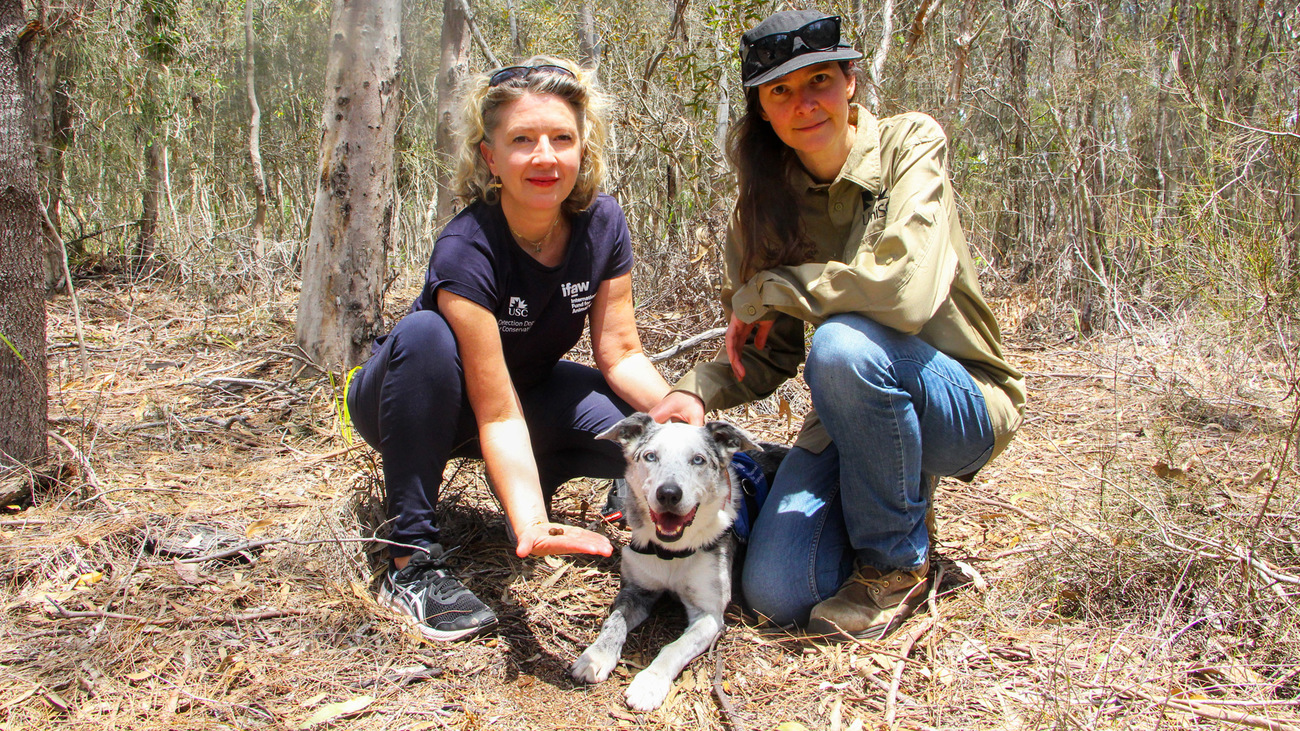Blog
Long’uro: one elephant’s story of immense resilience
Read moreWanted: New recruit for koala-saving canine crew

8 November 2023 – The search is underway in Australia for a new canine recruit to help detect and protect endangered koalas in the wild.
The University of the Sunshine Coast and IFAW are teaming up to find another four-legged member to add to UniSC’s Detection Dogs for Conservation team.
“We’re searching for a very special rescue dog to help save our iconic koalas—it’s a win-win,” IFAW Wildlife Campaigns Manager Josey Sharrad said.
“The pup who makes the grade will get to walk in the pawprints of the other koala-saving heroes in the team and continue their legacy.”
Since its inception, UniSC’s Detection Dogs for Conservation has worked tirelessly conducting health and habitat surveys and detecting sick and injured koalas in need of rescue around the country – especially in the wake of bushfires. The team has also been working with IFAW on a ground-breaking research project to identify and understand the impacts of fire on koalas.
“Since the 2019 fires, the team hasn’t stopped. We have been conducting a lot of post-fire recovery surveys, then there were floods and now we’re on standby with another fire season upon us,” said UniSC Detection Dogs for Conservation Director Dr Romane Cristescu.
“We know there’s another dog out there who can help us continue this incredibly important work. We just need help to find him or her.”
The right pup for the job will join a specialised team of canine conservationists - including UniSC X IFAW koala detection dog Bear who can detect koalas by the scent of their fur, Billie-Jean who finds fresh koala poo for DNA sampling, and recent recruit Austin, who can identify both koala and quoll habitat.
Their high energy and obsessiveness made it difficult for all three dogs to find a suitable home at animal refuge shelters, but it’s those same qualities that made them perfect for detection dogs.
UniSC’s Detection Dog for Conservation, in conjunction with IFAW, began the search for their first dog to train and track live koalas back in 2015.
That dog was Bear, who went on to achieve global stardom during the 2019-20 bushfires by using his nose to track down more than 100 koalas in the aftermath, earning the admiration of everyone from Tom Hanks to Leonardo DiCaprio in the process.
IFAW x UniSC are searching for a dog that:
If you think you have, or know a dog who fits the description, fill out this form for more information.
Photos and videos available here.
ENDS
Press Contact
IFAW Australia
Dominica Mack
m: +61 (0)460 432 901
e: dmack@ifaw.org
About IFAW (International Fund for Animal Welfare) - IFAW is a global non-profit helping animals and people thrive together. We are experts and everyday people, working across seas, oceans and in more than 40 countries around the world. We rescue, rehabilitate and release animals, and we restore and protect their natural habitats. The problems we’re up against are urgent and complicated. To solve them, we match fresh thinking with bold action. We partner with local communities, governments, non-governmental organisations and businesses. Together, we pioneer new and innovative ways to help all species flourish. See how at ifaw.org. IFAW acknowledges the Traditional Custodians of country and their connection to land, waters and culture. We pay our respects to their Elders, past and present.
About the University of the Sunshine Coast (UniSC) - UniSC is ranked by students as one of Australia's best universities for teaching quality and overall student experience. UniSC offers hands-on learning and flexible study options across more than 120 programs, at a network of teaching locations between Moreton Bay and the Fraser Coast. All UniSC programs include practical training or internships, and a focus on the core skills students need to succeed in the future workplace. Employers rate UniSC as one of the best universities for producing job-ready graduates. UniSC's international reputation for research is growing every year, with 26 research fields rated at world standard or above. Leading research areas include environmental sciences, nursing, medical and health sciences, biological sciences, engineering, technology, psychology, agricultural and veterinary sciences, human studies and communication. UniSC is committed to unlocking the innovation, productivity and full potential of our regions, and to working with government, industry and community to encourage prosperity in a knowledge-driven world.
Every problem has a solution, every solution needs support.
The problems we face are urgent, complicated, and resistant to change. Real solutions demand creativity, hard work and involvement from people like you.
Unfortunately, the browser you use is outdated and does not allow you to display the site correctly. Please install any of the modern browsers, for example:
Google Chrome Firefox Safari